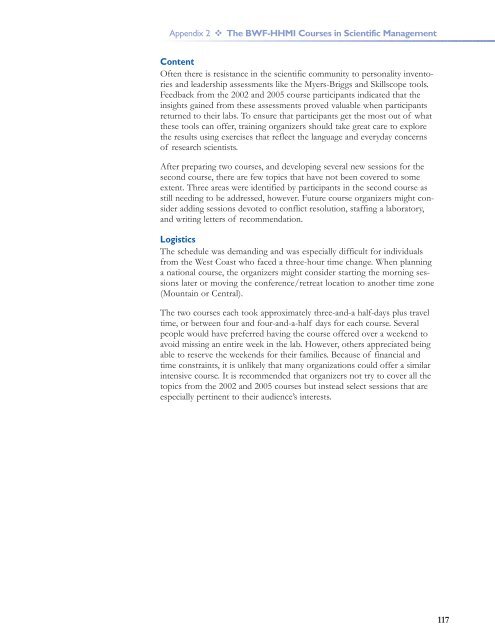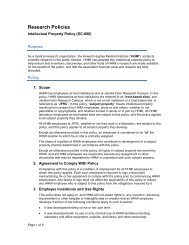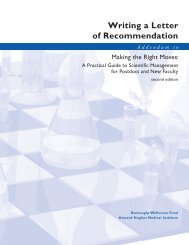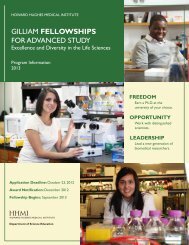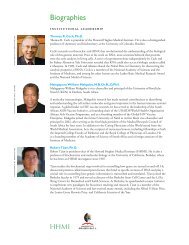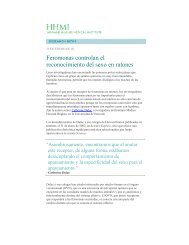Training Scientists to Make the Right Moves - Howard Hughes ...
Training Scientists to Make the Right Moves - Howard Hughes ...
Training Scientists to Make the Right Moves - Howard Hughes ...
You also want an ePaper? Increase the reach of your titles
YUMPU automatically turns print PDFs into web optimized ePapers that Google loves.
Appendix 2 The BWF-HHMI Courses in Scientific Management<br />
Content<br />
Often <strong>the</strong>re is resistance in <strong>the</strong> scientific community <strong>to</strong> personality inven<strong>to</strong>ries<br />
and leadership assessments like <strong>the</strong> Myers-Briggs and Skillscope <strong>to</strong>ols.<br />
Feedback from <strong>the</strong> 2002 and 2005 course participants indicated that <strong>the</strong><br />
insights gained from <strong>the</strong>se assessments proved valuable when participants<br />
returned <strong>to</strong> <strong>the</strong>ir labs. To ensure that participants get <strong>the</strong> most out of what<br />
<strong>the</strong>se <strong>to</strong>ols can offer, training organizers should take great care <strong>to</strong> explore<br />
<strong>the</strong> results using exercises that reflect <strong>the</strong> language and everyday concerns<br />
of research scientists.<br />
After preparing two courses, and developing several new sessions for <strong>the</strong><br />
second course, <strong>the</strong>re are few <strong>to</strong>pics that have not been covered <strong>to</strong> some<br />
extent. Three areas were identified by participants in <strong>the</strong> second course as<br />
still needing <strong>to</strong> be addressed, however. Future course organizers might consider<br />
adding sessions devoted <strong>to</strong> conflict resolution, staffing a labora<strong>to</strong>ry,<br />
and writing letters of recommendation.<br />
Logistics<br />
The schedule was demanding and was especially difficult for individuals<br />
from <strong>the</strong> West Coast who faced a three-hour time change. When planning<br />
a national course, <strong>the</strong> organizers might consider starting <strong>the</strong> morning sessions<br />
later or moving <strong>the</strong> conference/retreat location <strong>to</strong> ano<strong>the</strong>r time zone<br />
(Mountain or Central).<br />
The two courses each <strong>to</strong>ok approximately three-and-a half-days plus travel<br />
time, or between four and four-and-a-half days for each course. Several<br />
people would have preferred having <strong>the</strong> course offered over a weekend <strong>to</strong><br />
avoid missing an entire week in <strong>the</strong> lab. However, o<strong>the</strong>rs appreciated being<br />
able <strong>to</strong> reserve <strong>the</strong> weekends for <strong>the</strong>ir families. Because of financial and<br />
time constraints, it is unlikely that many organizations could offer a similar<br />
intensive course. It is recommended that organizers not try <strong>to</strong> cover all <strong>the</strong><br />
<strong>to</strong>pics from <strong>the</strong> 2002 and 2005 courses but instead select sessions that are<br />
especially pertinent <strong>to</strong> <strong>the</strong>ir audience’s interests.<br />
117


